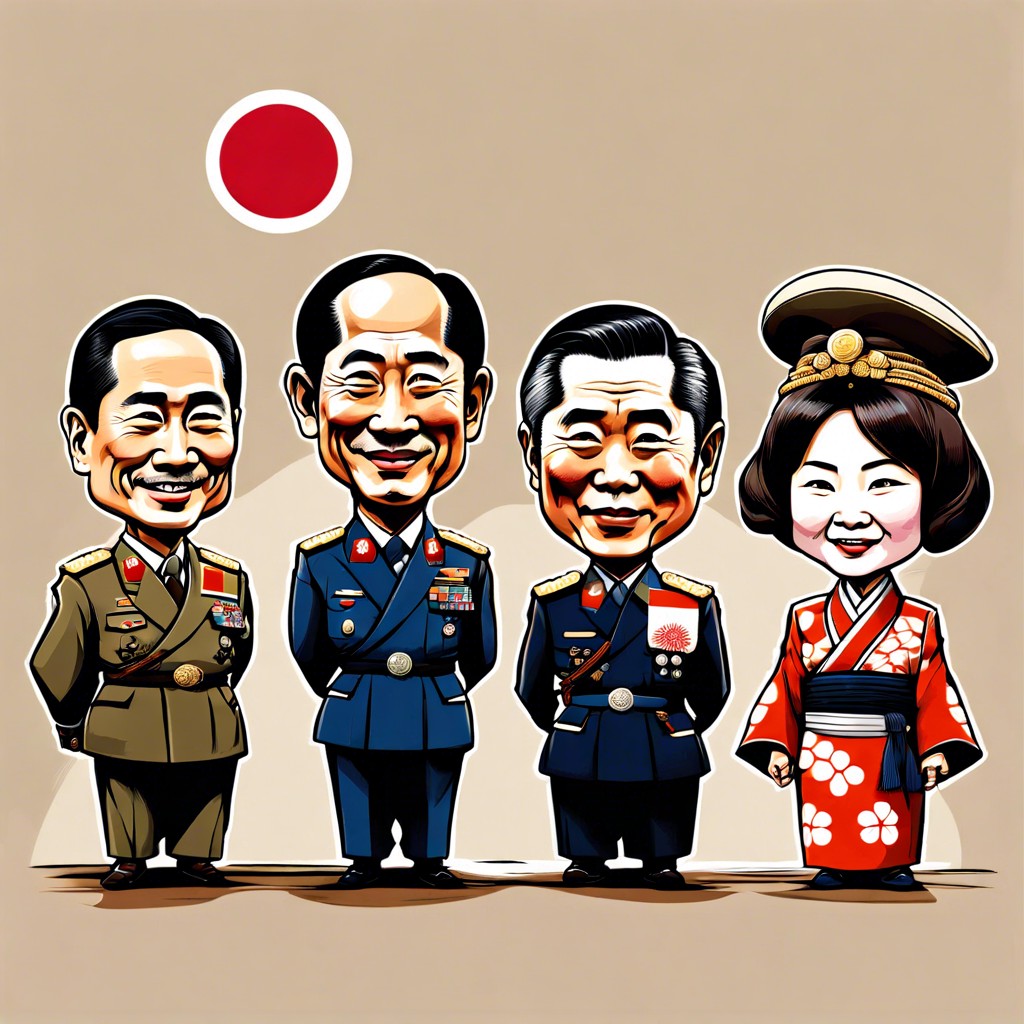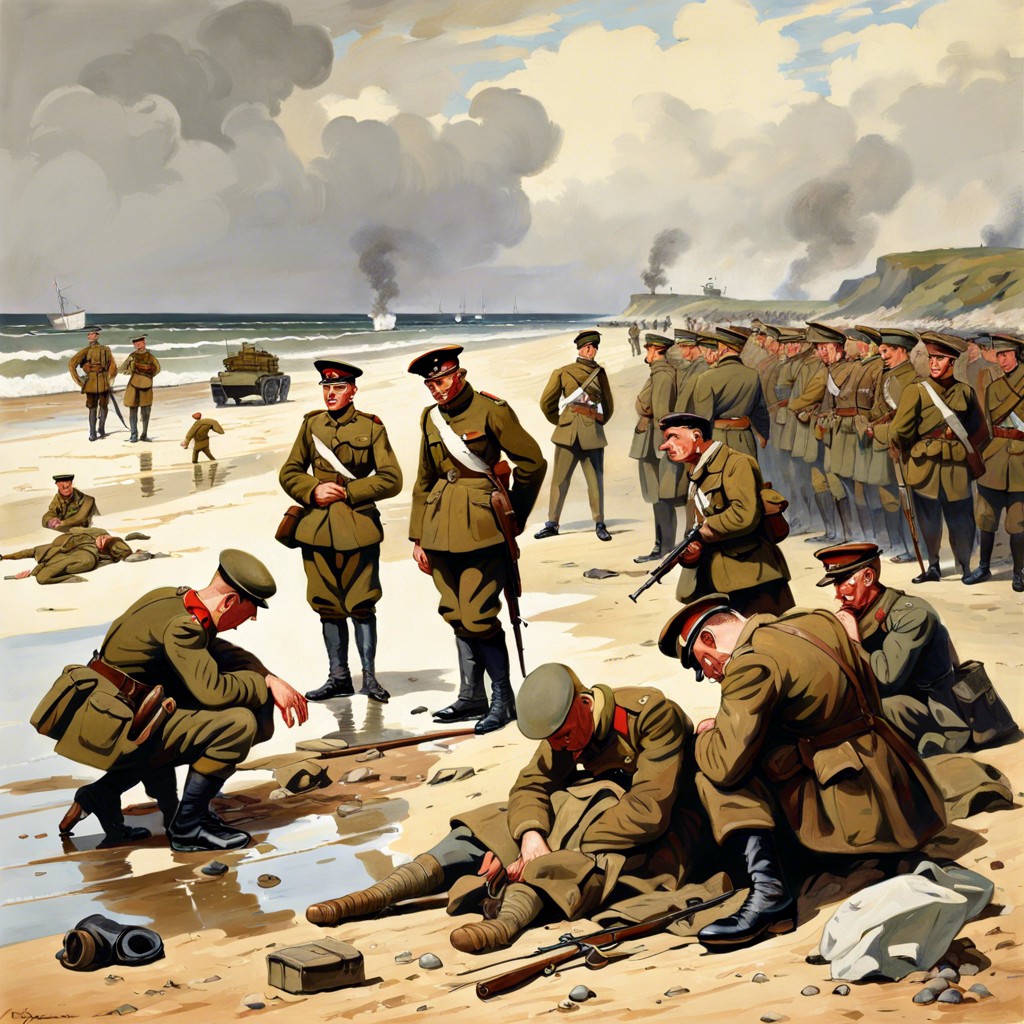Imagine a world where Japan joined the Allies in World War II; this article will explore the potential military strategies, economic impacts, and geopolitical shifts that could have emerged from this alternate history.
Imagine a world where sushi and spaghetti were allies against schnitzel and borscht. What if Japan joined the Allies during World War II? We’re diving into an epic remix of military strategies, economic chess games, and diplomatic dramas. Ready for a rollercoaster of cultural exchanges and power shifts? Buckle up; we’re about to explore all the juicy details of this alternate timeline!
Key takeaways:
- Japan on Allies side shifts Pacific strategies and military power.
- Economic boost with Japanese manufacturing aiding Allied production.
- Global dynamics change drastically with combined naval and ground forces.
- Diplomatic fallout with Axis powers leads to distrust and alliances fraying.
- Cultural fusion – sushi rations, musical, cinematic, and artistic exchange.
Realignment of Pacific Strategies

Imagine the meeting rooms in Washington, DC, and London: generals huddled over maps, suddenly making space for a new friend from the East. With Japan on the same team as the Allies, strategies in the Pacific theater would have taken a delightful twist.
First off, the U.S. might’ve deployed fewer resources to the Pacific. Property saved, lives spared, and, who knows, maybe even a few extra marshmallows at the celebration bonfires.
Shifts in naval deployment would be immediate. Japan’s superb navy would cover chunks of the Pacific, freeing up Allied forces for other pressing issues, like finally figuring out what to do with those mysterious, uncharted islands drawn on old pirate maps.
Supply lines? A breeze. Japanese ports and industrial hubs would become golden allies, making logistical nightmares more like logistical lucid dreams.
Also, picture an early addition of Japanese technology and tactics. We’d see Japanese zero fighters performing aerial ballet with Allied Spitfires and Mustangs, leading to a hybrid fighting style that would make even the most seasoned generals scratch their heads in awe.
In essence, a Japan with the Allies would reshuffle the Pacific decks, leading to new alliances formed over sushi and a shared disdain for the freezing waters of the Pacific. Alright, maybe not the sushi part, but you get the drift.
Economic Impacts On the Allied Powers
Imagine the boost to industrial production if Japan’s manufacturing might had joined the Allied side. Factories in Tokyo and Osaka churning out supplies, weapons, and vehicles for the war effort? It would resemble an economic dream come true. Allied logistics would gain a significant edge with a well-developed Japanese supply chain.
Trade routes could have expanded, reducing vulnerabilities and bottlenecks. Think fresh seafood in London and silk in New York, all courtesy of streamlined Allied trade with Japan. Let’s not forget the technological exchange. Japan’s knack for innovation could have accelerated advancements in areas like electronics. Allied soldiers could have carried cutting-edge gadgets not seen until much later.
Financially, pooling resources and knowledge may have led to breakthroughs in economic policies. Economies hobbled by the Great Depression might have roared back to life faster. Picture a 1940s economic boom, not just in the U.S., but extending across Europe and Asia, driven by collaborative industrial efforts.
Shifts in Global Military Power Dynamics
Japan joining the Allies would flip the global military script faster than a pancake in a hot pan. Imagine this: the Imperial Japanese Navy, once the terror of the Pacific, teaming up with the US and Britain. The Axis powers would face a nightmare on water and land.
First off, Japan’s technological innovations, like their carrier strategies, would boost Allied naval capabilities. Pearl Harbor? More like Pearl Helper.
Next, think of ground forces. Japanese troops with Allies means greater manpower in Asia. The Allied march through Asia and the Pacific would resemble a well-paced marathon rather than a crawl.
And let’s not forget, Japan’s geographical position would allow the Allies to launch operations into Europe or Africa through new avenues. Northern Australia would no longer be a lonely outpost but a bustling launch pad.
Talk about a game-changer. Axis forces wouldn’t just be outnumbered—they’d be outmaneuvered.
Diplomatic Consequences With Axis Powers
Let’s imagine the diplomatic fallout with Germany, Italy, and their pals. Picture a messy Thanksgiving dinner, but with more tanks and fewer mashed potatoes. The betrayal would have been monumental, akin to a soap opera plot twist nobody saw coming. Hitler’s mustache might have twitched in unexpected ways.
Mussolini, nursing a bruised ego, would likely have thrown a grand Italian tantrum, complete with dramatic speeches and gesticulations. Diplomatically, it would create a cascade of distrust and fragmented alliances within the Axis powers. With Japan teaming up with the Allies, Germany and Italy might scramble to strengthen relations with other Axis affiliates, potentially pulling in new, less reliable partners.
Also, consider Japan’s departure—like a domino effect—igniting thoughts of defection within other Axis nations. Smaller Axis-aligned countries could rethink their allegiance, wary of the looming powerhouse trio: the USA, the British Empire, and now Japan. So, the intricate web of Axis diplomacy would fray, leaving Hitler and Mussolini clutching at straws in a geopolitical cyclone.
Cultural Exchange and Influence
Imagine sushi becoming a staple ration among Allied troops. The world could have seen an explosion of cross-cultural pollination.
Jazz and J-Pop would have met decades earlier, leading to a fascinating musical fusion. Language exchange programs? They’d be off the charts, with soldiers swapping wartime slang and local idioms.
Hollywood and Japanese cinema might’ve collaborated, producing epic wartime movies with a blend of samurai and Western heroes. Anime, decades ahead of its time, could’ve influenced American animation in unexpected ways.
Fashion could witness a kimono-meets-trench-coat trend taking Paris by storm. Culinary styles mixing teriyaki with mashed potatoes would turn dinner times into unpredictable adventures.
The arts and literature would reflect this blend too, sparking new genres and artistic movements, merging Eastern philosophy with Western storytelling.
Would there be tea ceremony workshops held in London? Most likely. And sumo wrestling exhibitions in New York? Absolutely.




